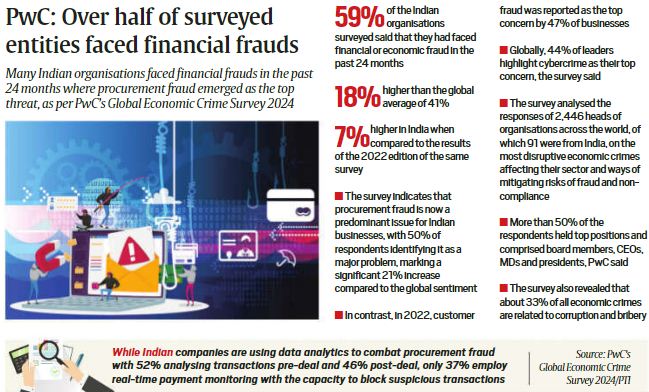December 23, 2024
PwC’s Global Economic Crime Survey 2024
PwC’s Global Economic Crime Survey 2024 provides a comprehensive analysis of the evolving landscape of economic crimes, drawing insights from nearly 2,500 companies across over 60 countries and territories.
Key Findings:
- Prevalence of Economic Crime: A significant number of organizations have encountered economic crimes in the past 24 months, with procurement fraud, cybercrime, and corruption being the most disruptive.
- Procurement Fraud: This traditional form of fraud remains prevalent, ranking among the top three most disruptive economic crimes globally. Despite its frequency, many companies lack adequate measures to detect or combat it.
- Third-Party Risk Management: A considerable portion of organizations either lack a third-party risk management program or do not perform risk scoring as part of their existing programs, increasing vulnerability to economic crimes.
- Supply Chain Risks: With heightened public scrutiny and regulatory demands, companies face increased pressure to identify and mitigate risks like forced labor within their supply chains. However, a significant number have not prioritized assessing these risks.
- Export Controls and Sanctions: The complexity of export controls has grown, with more than half of the surveyed executives perceiving stricter enforcement compared to two years ago.

Recommendations:
- Enhance Compliance Programs: Organizations should develop sophisticated compliance programs that not only prevent economic crimes but also support business resilience and growth.
- Leverage Technology: Implementing advanced data analytics and transaction monitoring solutions can aid in detecting suspicious activities, thereby mitigating risks such as overbilling, kickbacks, and collusion.
- Strengthen Third-Party Due Diligence: Regular risk assessments and ongoing monitoring of third parties are crucial to manage potential risks effectively.
- Address Supply Chain Human Rights Issues: Companies should proactively assess and address human rights-related risks within their supply chains to comply with emerging regulations and maintain public trust.
Daily Gist : The Hindu/Indian Express : 30 Jan 2025
January 30, 2025
Gist of editorial : the Hindu/ Indian Express/20 Jan 2025
January 20, 2025
Daily the Hindu/ Indian Express Editorial Gist: 14 Jan 2025
January 14, 2025
